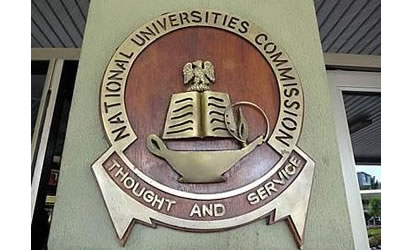THE Executive Secretary, National Universities Commission (NUC), Professor Abubakar Adamu Rasheed, has warned professional bodies to desist from unhealthy competition with the commission over the training of undergraduate students in the Nigeria university system..
Rasheed spoke in Abuja when he received the president of the Institute of Chartered chemists of Nigeria (ICCON), who was on a courtesy visit to seek collaboration with the Commission to rejuvenate the teaching of Chemistry in the Nigerian universities.

He made it clear at the event that NUC is the sole regulatory agency in charge of university education in the country with the responsibility to: lay down minimum academic standards for all academic programmes in the Nigerian University system give approval for the establishment of new academic programmes as well as ensure that quality is maintained in terms of teaching, human and material resources of the programmes through accreditation.
He disclosed that the commission had continued to open its door to professional bodies for collaboration in line with its mandate of leading the way of ensuring a quality university system that works for Nigerians.
“We don’t train chemists, we train graduates of Chemistry. I will advise that you latch unto these graduates, certify them and maybe provide some forms of additional training before you certify them.
“We are more than willing to collaborate with you; we would be willing to call meetings of heads of departments (HOD) of chemistry in our universities, senior professors who have made their marks in the profession, and captains of industries so that we can all chart a way forward for the programme and the profession,” he said.
The NUC executive secretary noted that Chemistry remains the driver of the 21st century industry and that no country in the world today could thrive without viable and productive chemists.
He added that if Nigeria must survive the competitive world, it must reengineer the chemistry profession in line with global best practices as it remains the bedrock to revolutionising the industrial sector of the country.
The NUC executive secretary stated that there was a need for the decentralisation of chemistry at the university level, and called on the institute to suggest ways of improving the curriculum of the programme.
“At the university, we don’t teach the same general chemistry across programmes like medicine and sciences, therefore, for us to truly engender the change we desire, there is a need to decentralise the profession to ensure professionalism.
“I assure you that the commission will continue to work with you to achieve the Nigerian university of our dream,” he stressed.
In her remarks, the chairman of Council, ICCON, Professor Fanna Inna Abdulrahman, stated that the institute is a regulatory agency under the Federal Ministry of Health, established by ICCON Act CAP. I.12 LFN 2004 charged with the primary responsibility to regulate the teaching of chemistry and the practice of the chemistry profession in Nigeria.
She added that the timely visit to the commission’s office was to seek possible areas of collaboration and support in order to strengthen the teaching of chemistry at the university level in the country.
She requested the commission to give consideration for the institute to be part of the accreditation team for Chemistry programmes in the universities, and as well ensure that only chartered members of the institute should be members of such accreditation team.
She also requested that Chemistry be considered as a core course in the Centres of Excellence in Nigeria.
The ICCON president noted that the institute had taken cognisance of the fundamental and statutory mandate of the NUC and that it was the premise upon which the body sought to advance and explore ways by which the subject of chemistry could be fully professionalised ab initio either at the pre-degree, undergraduate and postgraduate levels of studies.
According to her, the idea was not just to ensure the advancement of the subject but also promote the core responsibility of the NUC, which is transforming the universities to greater heights.
She said, “We are aware that knowledge is the global currency and as such it is extremely necessary to harness the vast human and material resources within this profession in building our science base as a nation.”
Professor Inna Abdulrahman explained that the subject of chemistry is central to all disciplines ranging from science, arts, and humanities, among others.
She, therefore, proposed that a stronger partnership with the commission would catalyse a phenomenal paradigm shift and accelerate the needed research and development in chemistry for growth of the chemical industry which remains the largest industry, in the world at the moment.
She informed the executive secretary that available data clearly indicated that the lack of proper regulation of chemistry had to a large extent inhibited the growth of the chemical industry.
The President acknowledged that the triple helix model has postulated a synchronization of the academia, government and industry as key to the economic growth of any nation and as such the continuous disconnect of this three factors in the Chemistry profession underscored the urgent need of the visit, as a way of seeking the Commission’s support in order to impact on the country’s development.
She also noted with pride that about 100 Universities in Nigeria offers Chemistry or Chemistry related courses, remarking that annually about 3,000 students graduate from Chemistry or Chemistry-related disciplines at both undergraduate and postgraduate levels.
She pointed out that the Chemical industry lacked the impetus to reckon with the incredible manpower provided by the Universities as a result of lack of regulation of the Chemistry profession.
Prof. Fanna said the commitment of the Institute towards addressing the issues of moribund or non-existent or sub-standards or non-functional Chemistry laboratories at the universities was envisaged as a mechanism of excellence in making the Chemistry profession worthwhile.
She added that through the triple helix model, the Institute hoped to promote the best practices of Chemistry programmes that would encourage entrepreneurship and progression in the practice of Chemistry in the 21st century.
“Our innovative approach is lucidly predicated on accentuating the nascent knowledge trends in Chemistry especially through robust development of the curriculum, capacity and collaboration on the subject”.







